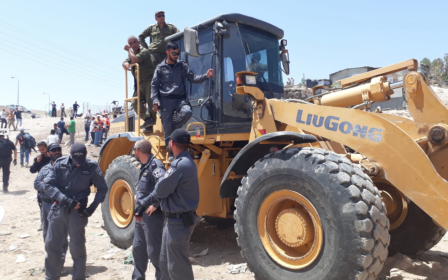Khan al-Ahmar: Scores of arrests and injuries in protest against demolition

The Israeli army arrested scores of Palestinian demonstrators and a French-American activist on Friday during a protest in Khan al-Ahmar, a village in the occupied West Bank that is expected to be demolished, despite an international outcry, in the coming days.
Frank Romano, a dual French-U citizen, was reportedly injured before his arrest along with several others, after Israeli soldiers used force to crush the protest against the town's demolition.
A former lawyer, Romano is the author of Love and Terror in the Middle East and, according to an online profile, currently works as a professor at Université Paris Ouest Nanterre La Défense.
Videos and photos circulated on social media showed protesters standing in front of a bulldozer controlled by the Israeli army, while others showed soldiers hitting and dragging protesters and Khan al-Ahmar's residents, and pushing away journalists.
Demolishing Khan al-Ahmar
Khan al-Ahmar is located in the central occupied West Bank near Route 1, which connects occupied East Jerusalem to the Jordan Valley.
The village is near the illegal Israeli settlement of Kfar Adumim, and has long been subjected to Israeli pressure calling for the community to be removed from the area.
Last week, Israel's High Court of Justice rejected petitions filed by residents of Khan al-Ahmar to halt the demolition, paving the way for the eviction of the community and razing of the entire village any time after 12 September.
This week, Saeb Erekat, secretary-general of the Palestinian Liberation Organisation (PLO), said a case has been filed with the International Criminal Court (ICC) regarding the planned demolition, urging the ICC's chief prosecutor to meet with its residents ahead of the court-sanctioned eviction.
"We hope that an official judicial investigation can be opened as soon as possible," Erekat said.
The residents of Khan al-Ahmar are from the Jahalin tribe, a Bedouin family expelled from the Naqab desert - also referred to as the Negev - during the 1948 Arab-Israeli war. The Jahalin then settled on the eastern slopes of Jerusalem.
The Khan al-Ahmar community comprises of some 35 families whose makeshift homes and schools, mostly made of corrugated metal and wood, have been demolished by the Israeli army several times in recent years.
Israel intends to demolish the village as part of the so-called E1 plan, which involves building hundreds of settlement units to link the settlements of Kfar Adumim and Maale Adumim with East Jerusalem in the Israeli-controlled Area C of the West Bank.If fully implemented, critics say the E1 plan would effectively split the West Bank in half, isolate East Jerusalem from Palestinian communities in the West Bank and force Palestinians to make even lengthier detours to travel from one place to another while illegal settlements would be able to expand.
Israeli officials said in July that they plan to relocate the 180 residents of Khan al-Ahmar to an area about 12km away, near the Palestinian village of Abu Dis.
But the new site is adjacent to a landfill, and rights advocates say that a forcible transfer of the residents would violate international law applying to occupied territories.
Stay informed with MEE's newsletters
Sign up to get the latest alerts, insights and analysis, starting with Turkey Unpacked
Middle East Eye delivers independent and unrivalled coverage and analysis of the Middle East, North Africa and beyond. To learn more about republishing this content and the associated fees, please fill out this form. More about MEE can be found here.






